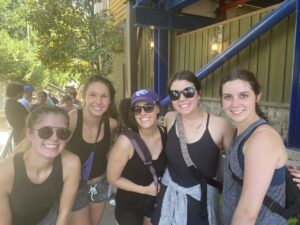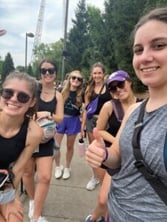
 Whether you’re a student or just starting out on your career path, internships can be a fantastic way to gain hands-on experience and insight into a field you want to work in. Among other uncounted benefits, an internship can offer you the experience you need to prepare you to enter the workforce full time. Plus, it boosts your chances of finding future employment — according to 2020 data collected by CompareCamp, completing an internship increases post-graduate job offers by 16%.
Whether you’re a student or just starting out on your career path, internships can be a fantastic way to gain hands-on experience and insight into a field you want to work in. Among other uncounted benefits, an internship can offer you the experience you need to prepare you to enter the workforce full time. Plus, it boosts your chances of finding future employment — according to 2020 data collected by CompareCamp, completing an internship increases post-graduate job offers by 16%.
Given the competitive value internships offer, it’s no surprise that landing an internship in your specific field can be a time-consuming process. From the hours of research to extensive interview processes, matching with the right internship can feel like finding a needle in a haystack – particularly in an industry as specialized as engineering.
At Dialectic, we know firsthand the value an internship can provide for young and aspiring engineers. To shed some light on navigating the engineering internship process, we asked our summer interns for their insights on how to land an engineering internship at an organization that’s the right fit for you.
Step 1: Do your research
Before you buy a new tie for your interview or print out fresh copies of your resume, there’s one step that should always come first: research. Research should be the most thorough part of the search process.
When we asked our interns what advice they would give a student on the hunt for an engineering internship, they all told us one thing: Familiarize yourself with the companies you are interviewing with. This shows your prospective employer that you’re motivated and invested in learning about their business.
“Look at the websites of the company you’re interviewing with and have questions ready. If there’s something that stands out to you, bring it in up your interview.”
– Eryn Samuelson, Kansas State University
Spend time exploring companies’ websites and social media platforms to learn as much as you can about their company. What kind of clients do they serve? What does their culture look like? Pay close attention to these key details, as well as current news they may be involved in and what services they offer. When researching, take the time to understand company values, memorize their mission statement and master the names and roles of key players in the company.
Now that you know about the company, apply your knowledge. Show your interviewer that you know them, their company and its goals. This could be anything from asking a meaningful question that ties back to the company values, sharing a personal anecdote or talking about an assignment in class that relates to the industry.
Step 2: Take advantage of your university’s opportunities
Not sure where to start in your research process? Start by checking out the resources at your university.
“My university had a job board where they posted companies that are coming to visit,” said Kayla Huffman, a junior at Kansas State University. “I signed up for a few, and one of them was Dialectic.”
Something as simple as checking a job posting could lead to your next opportunity.
Another way to get involved is to familiarize yourself with engineering-specific or related clubs like our interns did. Check out Illumination Engineering Society or the Mechanical Contracting Association. These organizations offer the opportunity to build connections with professional employers and engineering students at nearby schools.
Many of our interns were connected to opportunities through career fairs hosted by their universities. Career fairs create an environment for students to meet industry professionals and ask them questions in order to learn about the industry and possible areas of work. You’ll also be able to sharpen your networking skills. What have you got to lose?
“It’s never a bad thing to get interview experience,” said Abby Radmanesh, a junior at the University of Kansas, who’s back for her second summer as a Dialectic intern.
After a few rounds of career fair interviews, you’ll start feeling more comfortable as you go. In fact, some of our interns said they purposely scheduled interviews with their top prospective employers for later in the day, just to work through those first-round jitters.
How can you stand out to potential employers at a career fair? Ask smart questions. We always take notice when students ask questions like these:
- How can I enhance my skillset between now and starting at a company like yours?
- What does a typical day look like in your office?
- What are some challenges and opportunities you have faced in your role and/or company?
- What is the best way to stay in touch with you?
Step 3: Know your values
Once you’ve landed an interview, it’s important to make sure this internship is the right fit for you.
To do this, you’ve got to look inward: Understand yourself, your interests and your hobbies. What motivates you? What are you looking to gain from this internship? Even if you’ve got the grades and the resume, employers want a more holistic view of you to understand how you’ll fit into the company culture.
At Dialectic, our values drive our interviewing and selection process, so it’s important to us that candidates can talk about more than their qualifications and work history. We want to see a more holistic picture of you as an individual, too.

“[Dialectic] is focused on hiring good people that will add positivity to their environment. They can teach you everything you need to know as long as you’re a team player.”
-Kelly Keiter, The University of Kansas
While company culture is undoubtedly important, it should not be the only factor of your search. Prior to pursuing a specific company, confirm that they provide expertise in your area of concentration.
University of Kansas junior Hannah Engelland recalled that she was drawn to Dialectic’s internship program because we offered lighting design, which was of high interest to her.
“When I brought [lighting design] up in my interview, they were very passionate about it too and wanted to make sure it was something I could do in the future,” she said.
These days, most companies look for a proper culture fit when hiring a new employee. The ability to express your identity gives the interviewer a more accurate chance at establishing the right fit for you.
Learn more about our interns
Curious about what our interns are up to this summer? Stay tuned on our social platforms to watch Kelly Keiter, Hannah Engelland, Eryn Samuelson, Kayla Huffman and Abby Radmanesh take you along on a day in the life of Dialectic’s interns.
This blog was crafted by marketing intern Kate Rinehart. Founded in 1988, Dialectic is a 100% employee-owned, nontraditional mechanical, electrical and plumbing engineering firm. Recognized as one of Kansas City’s Best Places to Work in 2020, Dialectic brings buildings to life across a broad range of verticals, including distribution, multifamily, retail/restaurants, cannabis, entertainment, senior living, hospitality and charter sc
hools/higher education. Learn more at dialecticeng.com.

